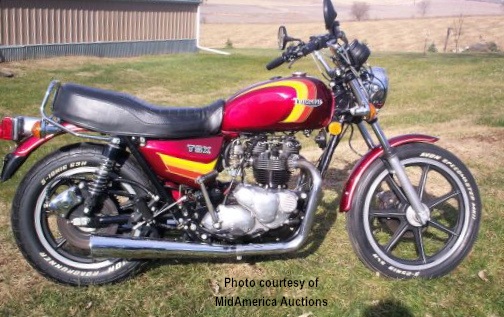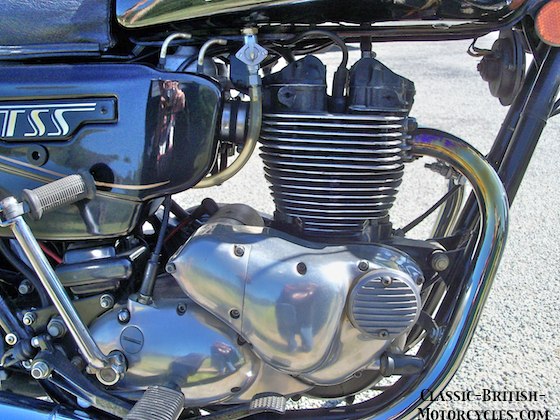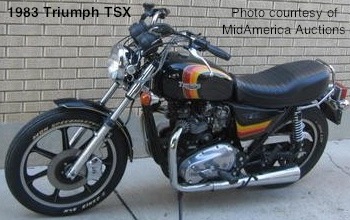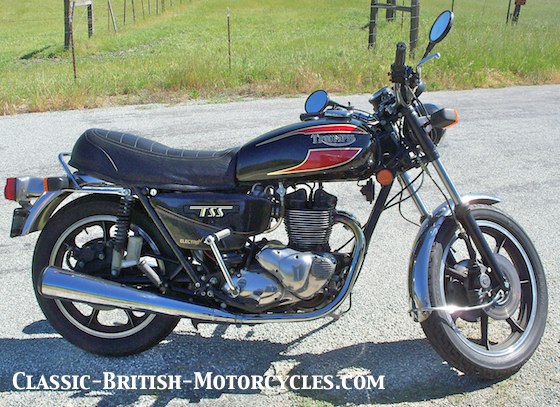ABOVE: 1983 Triumph Bonneville TSX, factory custom in Gypsy Red.
8-VALVE HEAD
As close as they were to the brink of extinction, the optimists at the Meriden Co-operative still believed it could be turned around, and the only way was through product. Nothing like an entirely new DOHC 4-cylinder or the like, but maybe a whole new 4-valve (per cylinder) head for the antiquated 1983 Triumph Bonneville was within reach. As strange as this sounds today, it probably made sense at the beginning of 1983.
MERIDEN CO-OP STRUGGLES
What the public didn’t see was the life-or-death, day-to-day struggles the workers & management of the Co-op were going through just trying to survive. There always seemed to be a salvation of some sort within reach, however, either through public or private funding. Undercapitalized such that they couldn’t even afford to produce the 1983 Triumph Bonnevilles that had been ordered by dealers, they were told by all the “experts” that funding would only be possible with a solid 5-year plan to turn things around. And new products were at the top of the list. On a shoestring, the resourceful boys at Triumph managed to cobble together the next-generation of Triumph Motorcycles, the Diana 900cc DOHC water-cooled twin that stole the NEC Motorcycle Show in 1983 in England. Alas, this potentially successful machine never reached production.
DESPERATE MEASURES
Triumph Motorcycles needed to do something for sure and in this, their last year in business, they really pulled out the stops. Considering how strapped for cash they were & how little they had to work with in terms of modern equipment & manpower (over 2/3 of the Meriden workforce had been laid off by this time), doing a radical redesign of the Bonneville’s entire top end & major parts of the bottom end was a daunting & ambitious undertaking. But again, those scrappy Brits at Meriden found a way.
ABOVE: The timing side of a ’83 Bonneville TSS, with 8-valves-per-cylinder & electric start. A very rare machine indeed. And very fast.
MORE SPECIALS
With their credit rating falling & the company running out of money, the determined team cobbled together two new “Specials” for the 1983 model year: The Bonneville TSX (another highly-styled appearance package) & the radical 1983 Triumph Bonneville TSS with 8 valves in the head (4 valves per cylinder).
1983 TRIUMPH BONNEVILLE – TOO LITTLE TOO LATE
Sadly even the radical TSS was a case of “too little too late” & it wasn’t possible to fully develop the bike as it needed to be a real first-class contender. But this new engine showed promise to pump some performance back into the aging 1983 Triumph Bonneville with a claimed 59 hp & a top speeed of 125 mph.
1983 TRIUMPH BONNEVILLE TSS
The TSS was essentially a standard 1983 Triumph Bonneville T140ES with the addition of an entirely alloy cylinder & head which was based on the old Westlake 8-valve racing heads of the 1960s, with some technical help from Westlake & a license to produce them. The engine cases were standard T140ES, with an all new crank turning on higher-spec bearings, supposedly able to spin to 10,000 rpm. This one-piece forging had larger diameter 1.875″ big-end journals & thicker webs. Interestingly, the bore centers were spread apart by 1/2″ so offset connecting rods were used to make up the difference. The top end cooling fins were of a higher pitch than traditional Bonnies, and more square. Compression ratio was 9.5:1 & the conventional head gasket was replaced with 2 Cross-rings that seated in the head. There were still 10 head bolts, but the outer 4 were now studs running all the way through the cylinder block to the crankcase. The 4 valves per cylinder were now more steeply angled than before (the valves in a traditional Triumph 650/750 twin are at a 90-degree angle relative to each other; the TSS valves were at 60 degrees, which allows for better flow) & were actuated by forked rocker arms, each operating 2 valves apiece. The head was cast such that the rocker shafts no longer rode in detachable rocker boxes, instead they were supported by beefy bosses cast right into the head. This is an improvement that would have benefited the traditional Triumph Bonneville engine greatly, since the detachable rocker boxes are under such rocking forces, stresses while torquing down the head (pre-1971) & the were prone to leaking. The entire top cover could be removed on the TSS revealing the valve gear & making it much easier to adjust the valve clearances.
1983 TRIUMPH BONNEVILLE – TEETHING PROBLEMS
The 1983 Triumph Bonneville TSS was probably a good design, but unfortunately quality control issues plagued it from the start. Porous head castings were a problem. The TSS used 34mm Amal Concentric MkII carbs in England, but the US had to do with the same old 32mm Bing CV carbs, because of emissions regs.
1983 TRIUMPH BONNEVILLE RUNNING GEAR
The standard 1983 Triumph Bonneville T140ES soldiered on pretty much unchanged. The 1983 Triumph Bonneville TSS got a Brembo rear master cylinder & the swing arm was widened to accomodate a larger rear tire, a 5.10 X 16″, with a 3.25 X 19″ up front. Rear shocks the the TSX were Pailois with chrome springs & black bodies. Marzocchi shocks were used on all other models this year, with the TSS using Marzocchi’s top line Strada units with remote oil reservoirs. The TSX got polished fork sliders but the rest of the line got the black-out treatment. Morris alloy wheels were now fitted to every 1983 Triumph Bonneville with the exception of US-market T140s, which retained the wire wheels.
1983 TRIUMPH BONNEVILLE BODYWORK
The Euro tank was used on all models except the TSX which sported a 3.6 US gal ‘peanut’ tank with hinged central fuel cap & only one petcock (with crossover tube). The wild new colorful striping packages were now stick-on vinyl applique’s, not painted-on stripes. Applied on tanks with compound-bent surfaces, wrinkles were common. The 1983 Triumph Bonneville T140ES got chromed fenders again, but all others were painted. The TSS could be painted all black with gold double pinstripes. Paint colors for 1983 were more plentiful than ever in Triumph’s history with no less than 8 color combos for the UK & 8 for the US markets.
1983 TRIUMPH BONNEVILLE – END OF THE LINE
In the end, one must wonder if they knew how close to the end it was, otherwise why come out with a radical new bike? They must have made themselves believe that the TSS would do the trick, get them back into the game. In the end, hot rodding a 40-year-old pushrod twin would have never worked in the face of technologically-advanced new 3-, 4- and even 6-cylinder bikes pouring out of Japan. The same year Triumph introduced its quirky TSS, Honda came out with its 750 Interceptor with state-of-the-art DOHC, 16-valve 90-degree V-4 engine that was fast, smooth, sexy & well put together. The Interceptor ushered in a whole new age of race-inspired sportbikes that would certainly have woefully outclassed the ancient 1983 Triumph Bonneville, no matter how it was modified. Times had changed, progressed moved on. The Triumph Bonneville, once the fastest production motorcycle in the world, was now an outdated, irrelevant relic of the past.
ABOVE: 1983 Bonneville T140-TSX, factory custom in Black, designed by Triumph’s US subsidiary Triumph Motorcycles America (TMA) to accommodate the ‘custom cruiser’ market. It had what was called the “West Coast-look” & actually sold fairly well. Unfortunately, Triumph was so broke by this point that they couldn’t afford to build the bikes to meet the orders.
ABOVE: 1983 Triumph Bonneville TSS
LIFE OR DEATH
The 1983 Triumph Bonneville TSS was a last-ditch attempt by Triumph Motorcycles to modernize the venerable vertical twin. A new all-alloy top end with 4 valves per cylinder with a new crank & rods netted 59 hp. Designed with help from Westlake, who was supposed to also be the supplier. However, it turned out that Westlake was also strapped for cash & would often place Triumph’s work aside to take cash jobs! As the result, there were never enough TSS 8-valve heads to meet demand. Also, the Westlake heads proved to be porous & leaked oil. Ultimately, Triumph had to take over production of the top ends for themselves, just to guarantee supply. These bikes were supposed to be very fast. I rode with this bike (pictured above) on the recent Quail Ride through the Carmel Hills. Unfortunately, it wasn’t running right that day & was idling very high. But a beautiful & historically-important motorcycle nonetheless. And he rides it!! How cool is that?
1983 Triumph Bonneville SPECIFICATIONS
|
T140AV Bonneville T140ES Bonneville T140TSX Bonneville T140W Bonneville Engine type Displacement Bore & Stroke Compression Carburetors Ignition Engine output Primary drive Primary sprockets Clutch Gearbox Ratios, overall: 1st, bottom 2nd 3rd 4th 5th, top Final drive Final drive sprockets Frame type Suspension, front Suspension, rear Brake, front Brake, rear Tire, front Tire, rear Fuel capacity Wheelbase Seat height Ground clearance Weight |
Anti-Vibration Roadster Electric Start Roadster TSX Factory Custom TSS – 8-valve engine Air-cooled OHV vertical twin 744cc / 45.0 ci 76mm X 82mm / 2.99″ X 3.23″ 8.6:1 2- Bing Type-94 CV Battery & coil, electronic, Lucas 49 bhp @ 6200 rpm 3/8″ triplex X 84 links Engine 29T X Clutch 58T Multi-plate, wet 5-speed constant-mesh, left-foot shift 12.25:1 8.63:1 6.58:1 5.59:1 4.7:1 5/5″ X .400″ X 3/8″ chain X 106 links Gearbox 19T X Rear 47T All-welded, oil-bearing large-tube backbone Telescopic fork, hydraulic damping 2-way Swing arm, 2 Girling dampers 10″ disk, 2-piston hydraulic caliper 10″ disk, 2-piston hydraulic caliper 3.25″ X 19″ Dunlop, ribbed 4.00″ X 18″ Dunlop, universal 2.5 Imp gal (US) / 4 Imp gal (UK & export) 54.5″ / 140.3 cm 32.5″ / 77.5 cm 5″ / 12.7 cm 403 lbs/ 183 kg |





